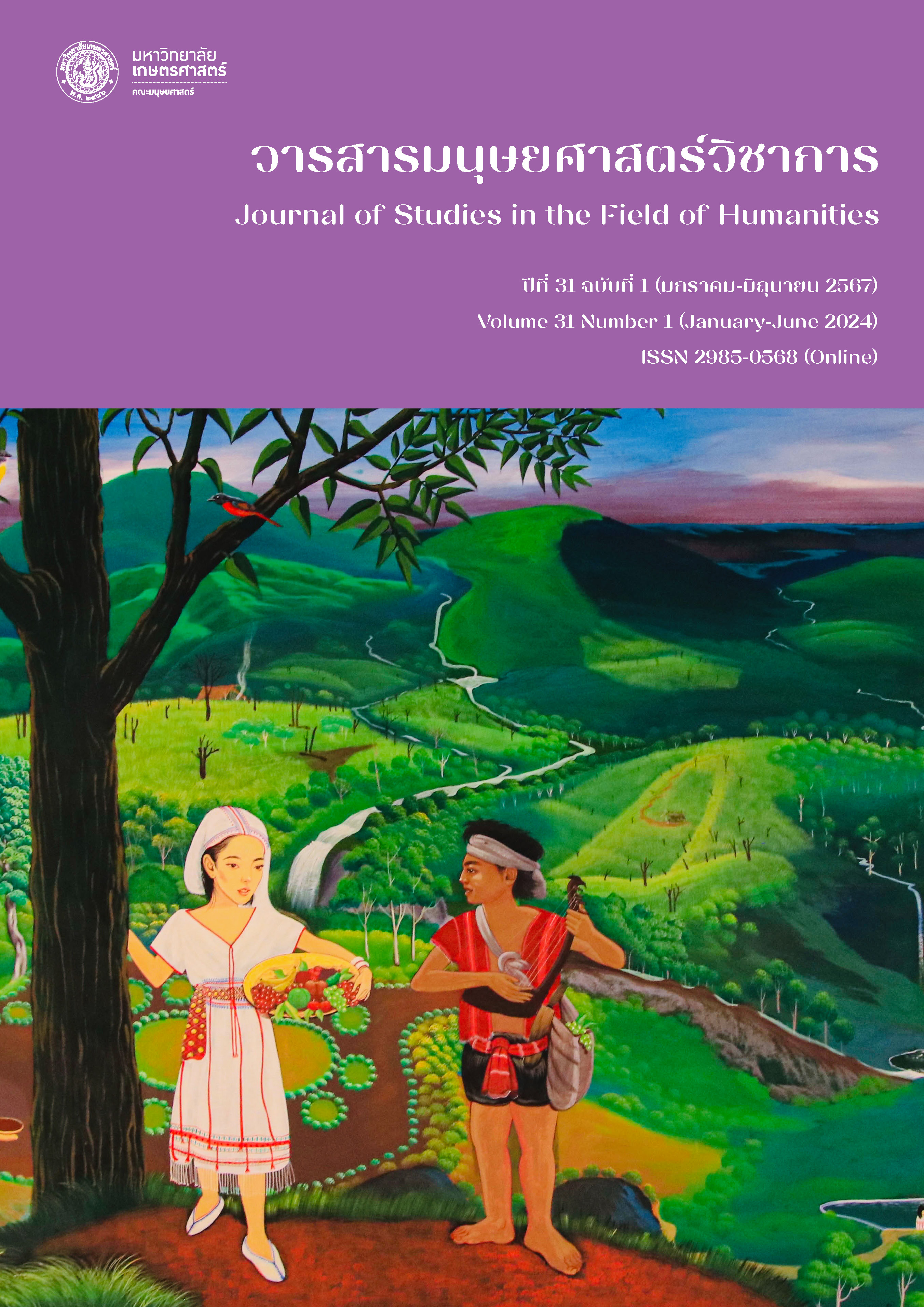Glass Garden: An Ecocritical Study
Main Article Content
Abstract
This paper studies Glass Garden (2017) through the lens of ecocriticism to explore the film’s concerns over the impact of natural resource utilization and its awareness building on bioethics. The study reveals that the film portrays the relationship among the advancement of technology, natural environment, and human society through the content which revolves around the interaction between human and nature, ethical behaviors conflicting with norms, demeaning of the value of human beings, and the complexity and unpredictability of biotechnological research. The conclusion drawn is that the film significantly illustrates a remark that human must find a balance to live in a conflictive and disruptive society and to prepare for ethical challenges.
Article Details

This work is licensed under a Creative Commons Attribution-NonCommercial-NoDerivatives 4.0 International License.
References
ทนงศ์ จันทะมาตย์, และธัญญา สังขพันธานนท์. (2562). ภาพแทนของธรรมชาติกับสิ่งแวดล้อมและพลวัตของสำนึกเชิงนิเวศในนวนิยายไทยระหว่าง พ.ศ. 2475-2556. วารสารสันติศึกษาปริทรรศน์ มจร, 7(1), 213-223.
ยุพยง ทัศคร, และมารศรี สอทิพย์. (2561). สำนึกนิเวศลุ่มแม่น้ำโขงในนวนิยายสายน้ำและชายชรา: เรื่องเล่าจากคอนผีหลง. วารสารมนุษยศาสตร์สังคมศาสตร์ มหาวิทยาลัยขอนแก่น, 35(3), 90-113.
วิโรจน์ เจษฎาลักษณ์. (2553). ความสัมพันธ์ระหว่างความยุติธรรมด้านผลลัพธ์และด้านกระบวนการกับพฤติกรรมการเป็นสมาชิกที่ดีขององค์กร และผลการปฏิบัติงานตามบทบาทหน้าที่ผ่านการรับรู้การสนับสนุนจากองค์กร. วารสารมหาวิทยาลัยศิลปากร, 30(2), 65-81.
สาคร สมเสริฐ. (2556). ความแปลกแยกของมนุษย์ในสังคมสมัยใหม่. วารสารนักบริหาร, 33(3), 66-74.
อรวรรณ ฤทธิ์ศรีธร. (2562). ภาพแทนและการประกอบสร้างความจริงเรื่องธรรมชาติในนวนิยายแนวจินตนิมิตของไทย (วิทยานิพนธ์ดุษฎีบัณฑิต). มหาวิทยาลัยมหาสารคาม, มหาสารคาม.
Buell, L., Heise, U. K., & Thornber, K. (2011). Literature and environment. Annual Review of Environment and Resources, 36, 417-440.
Freud, S. (1933). New introductory lectures on psycho-analysis. In J. Strachey et al. (Trans.), The standard edition of the complete psychological works of Sigmund Freud (pp. 4667-4669). London: Hogarth Press.
Ivakhiv, A. (2008). Green film criticism and its futures. Interdisciplinary Studies in Literature and Environment, 15(1), 1-28.
Jung, S. (2019, February 19). Support for first-in-class drug development: South Korean government to invest 3 Trillion Won in biotech industry. Retrieved from http://www.businesskorea.co.kr/news/articleView.html?idxno=29244.
Kohzadi, H., & Azizmohammadi, F. (2014). Eco-Criticism’s hostility versus anthropocentrism’s hostility in literature. Anthropologist, 17(2), 655-667.
Marx, K. (2016). Economic and philosophic manuscripts of 1844. In W. Longofer, & D. Winchester (Eds.), Social Theory Re-Wired (2nd ed.) (pp. 152-158). Abingdon: Routledge.
Monast, J. J. (2018). Editing nature: Reconceptualizing biotechnology governance. Boston College Law Review, 59(7), 2377-2436.
Naess, A. (2008). Ecosophy T: Deep versus shallow ecology. Environmental Ethics: Readings in Theory and Application, 223-231.
Oppermann, S. (1999). Ecocriticism: Natural world in the literary viewfinder. Journal of Faculty of Letters, 16(2), 29-46.
Porter, A. (2017). Bioethics and transhumanism. Journal of Medicine and Philosophy, 42(3), 237-260.
Rolston, H. (2003). Value in nature and the nature of value. In A. Light, & H. Rolston (Eds.), Environmental ethics: An anthology (pp. 143-153). Massachusetts, USA: Blackwell Publishing.
Rosadiuk, J. A. (2018). A framework for an eco-philosophical hermeneutics of cinema (Doctoral dissertation). Concordia University, Montreal.
Sandifer, P. A., Sutton-Grier, A. E., & Ward, B. P. (2015). Exploring connections among nature, biodiversity, ecosystem services, and human health and well-being: Opportunities to enhance health and biodiversity conservation. Ecosystem Services, 12, 1-15.
Siuta, J., Domagała, Z., Pluta, D., Tokarski, M., Iwan, D., Jurek, T., & Dobosz, T. (2020). Body donation as the basis for advance in medicine in past and today-meaning, principles, controversies. In Ł. Biały, & I. Młynarczuk-Biały (Eds.), Advances in biomedical research-from COVID to medical humanities (pp. 187-198). Lublin, Poland: Wydawnictwo Naukowe TYGIEL.
Tillmann, S., Tobin, D., Avison, W., & Gilliland, J. (2018). Mental health benefits of interactions with nature in children and teenagers: A systematic review. Journal of Epidemiology and Community Health, 72(10), 958-966.
Wilson, E. O. (1993). Biophilia and the conservation ethic. In S. R. Kellert, & E. O. Wilson (Eds.), The Biophilia Hypothesis (pp. 31-41). Washington: Island press.
Yoon, J., Cho, S. K., & Jung, K. W. (2010). The challenges of governing biotechnology in Korea. East Asian Science, Technology and Society: An International Journal, 4, 335-348.
Zovko, J. (2019). What is so specific about moral judgment in bioethics?. Bioethics Update, 5, 25-33.


